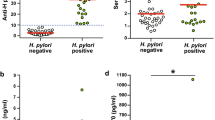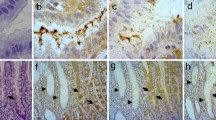Abstract:
The cytotoxin-associated gene (cagA) and vacuolating cytotoxin (Vac) production have been reported to be major virulence factors of Helicobacter pylori. However, there have been some disputes regarding the correlation between these virulence factors and clinical outcomes. We evaluated whether the cagA-positive genotype and Vac production might be cor-related with various gastroduodenal diseases in Korea and whether this correlation could be due to differences in proinflammatory cytokine gene expression and apoptosis of gastric epithelial cells in vitro. The presence of the cagA gene was examined by the polymerase chain reaction (PCR), and Vac production was detected using the bacterial culture supernatant and HeLa cells after H. pylori was isolated from Korean patients. Gastric epithelial cells were infected with cagA +Vac+, cagA +Vac−, or cagA −Vac− strains, after which cytokine gene expression was evaluated, using quantitative reverse transcription (RT)-PCR. Apoptosis and caspase-3 activation were measured in H. pylori-infected gastric epithelial cells. There was no significant correlation between the presence of these virulence factors in H. pylori isolates and peptic ulcer or gastric cancer. Upregulation of cytokine gene expression, including that of interleukin (IL)-1α, IL-8, granulocyte macrophage colony-stimulating factor (GM-CSF), and monocyte chemotactic protein (MCP)-1, as well as apoptosis and caspase-3 activation, were similar in infections with cagA-positive and cagA-negative strains, but were not correlated with the production of Vac. These results suggest that the lack of correlation between virulence factors of isolated H. pylori strains and serious gastroduodenal disease entities in Korea may be due to the similar capacity for proinflammatory cytokine gene expression and apoptosis caused by infection with each of the H. pylori strains.
Similar content being viewed by others
Author information
Authors and Affiliations
Additional information
Received: April 10, 2000 / Accepted: July 14, 2000
Rights and permissions
About this article
Cite this article
Kim, J., Kim, J., Jung, H. et al. Virulence factors of Helicobacter pylori in Korean isolates do not influence proinflammatory cytokine gene expression and apoptosis in human gastric epithelial cells, nor do these factors influence the clinical outcome. J Gastroenterol 35, 898–906 (2000). https://doi.org/10.1007/s005350070003
Issue Date:
DOI: https://doi.org/10.1007/s005350070003




